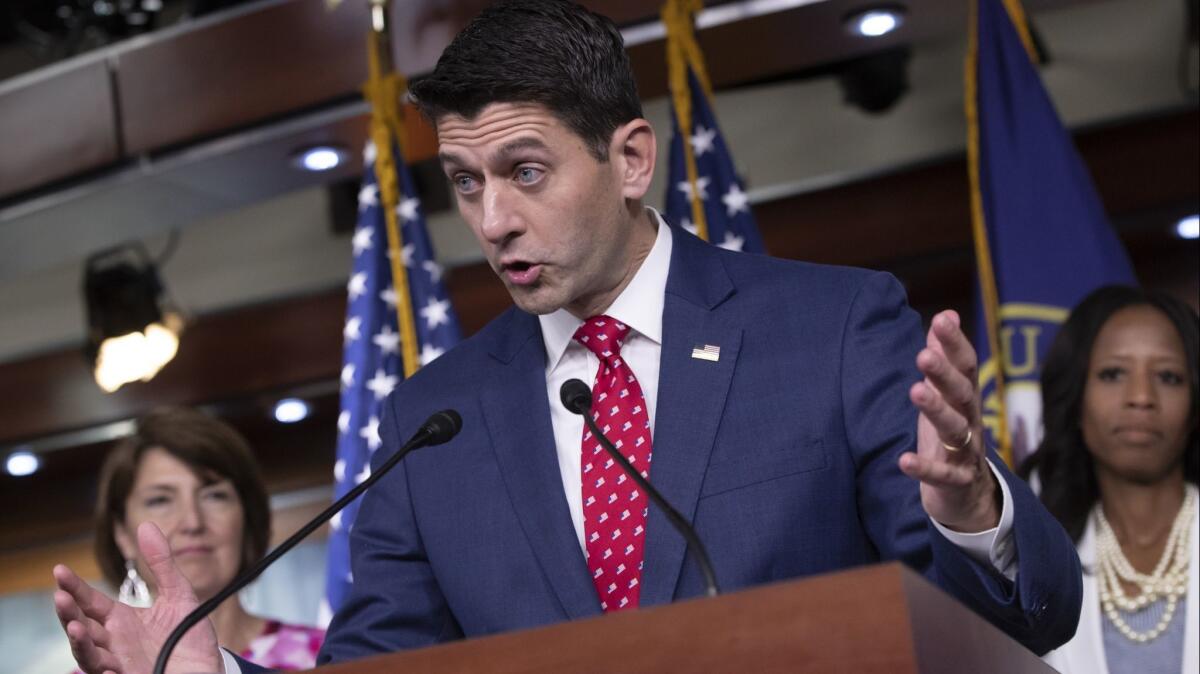Op-Ed: The Republican response to Trump and Putin’s lovefest was a profile in cowardice

- Share via
Only a handful of prominent Republicans have been brave enough to condemn President Trump head-on for his shameful announcement that he trusts the word of Vladimir Putin, who says Russia did not interfere in the 2016 election, over that of the U.S. intelligence community. (A day later, Trump tried to backpedal, but his “clarification” wasn’t entirely convincing.)
“No prior president has ever abased himself more abjectly before a tyrant,” thundered Sen. John S. McCain (R-Ariz.).
For the record:
10:10 a.m. July 20, 2018This op-ed initially stated that members of Congress are required to release their tax returns. Many do voluntarily, but it is not a requirement.
“Disgraceful and detrimental to our democratic principles,” said Mitt Romney, the former presidential candidate running for a Senate seat in Utah.
“The most serious mistake of his presidency,” said Newt Gingrich, the former House speaker.
But if those were the comments you noticed from the headlines, you were misled — because most Republicans were far more circumspect.
The Republican Party deserves a serious debate over its future instead of surrendering its soul to Trump for another four years.
The party’s leaders in the Senate and House, Mitch McConnell of Kentucky and Paul D. Ryan of Wisconsin, were studiously mild. Instead of criticizing Trump directly, they merely noted that Russia is an adversary, not a friend — as if reminding the president of an obscure fact he had overlooked.
“The president must appreciate that Russia is not our ally,” Ryan said, sounding like a gentle schoolmaster.
Others simply dodged the microphones and cameras — the political equivalent of pulling the covers up over your head and hoping the problem goes away.
There weren’t many profiles in courage to be found among the putative heirs of Ronald Reagan this week. Most GOP officeholders are terrified of their own primary voters, who have shown themselves willing to punish any politician who differs with Trump.
Besides, we’ve heard anguished words from Republicans before. And what matters most is what they do. Will members of the GOP majorities in Congress act to prevent the president from doing more damage to U.S. foreign policy?
They can’t stop the president from railing against special counsel Robert S. Mueller III and cozying up to Putin. But there’s plenty they can do to get in his way — to raise the political and legal costs of Trump’s most dangerous impulses.
Some actions should be easy, especially since Trump’s pro-Russia policy is unmoored from his party’s traditional Reaganesque hawkishness.
Congress can pass new resolutions supporting NATO, and add more sanctions against Russia. (McConnell’s deputy, Sen. John Cornyn of Texas, suggested both of those already.)
It can insist on more spending to defend the North Atlantic Treaty Organization’s vulnerable eastern frontier in Poland and the Baltic countries.
It can hold up Trump administration nominations, especially in national security — at the very least, to insist on ambassadors who won’t go to Europe bent on undermining NATO further. (Trump’s new ambassador in Germany, Richard Grenell, has made himself famous for saying he wants to “empower” the European right.)
Harder but equally important, Congress can protect Mueller and his supervisor, Deputy Atty. Gen. Rod Rosenstein, against Trump’s wrath.
Several members of Congress have drafted legislation to prevent Mueller from being fired. If the leaders ever allowed a well-crafted measure to reach the floor, it would attract bipartisan support.
In the House, tea party Republicans say they plan to introduce articles of impeachment against Rosenstein; Ryan is quietly trying to make sure that never happens.
Enter the Fray: First takes on the news of the minute from L.A. Times Opinion »
And, just to be idealistic, a bipartisan coalition should pass legislation requiring the president to release his tax returns.
Finally, one of those principled Republicans should begin planning a campaign to oppose Trump’s re-nomination in the GOP primaries in 2020 — as a Reagan Republican.
A dissenting campaign looks doomed to failure right now, given Trump’s stratospheric poll numbers among the shrinking GOP base. But that’s not the point. Trump may not be flying so high by 2020. His trade wars could bring on a recession. Mueller’s investigation could bring him down. In any case, the Republican Party deserves a serious debate over its future instead of surrendering its soul to Trump for another four years.
What about inside the administration? Should officials on Trump’s staff resign if they disagree with the president’s direction?
Dan Coats, the director of national intelligence, should surely quit after Trump publicly dismissed his findings about Russia, if only for the sake of self-respect.
John Bolton, the national security advisor, and Michael R. Pompeo, the secretary of State, are lifelong hawks with no illusions about Putin. If they abet Trump’s continued subversion of Western democracies, they’re betraying their own beliefs.
GOP veterans I respect insist that there’s a case for them to stay — if they can honestly conclude that their presence is mitigating Trump’s worst impulses instead of enabling them. That case is clearest in the case of Defense Secretary James N. Mattis, who has talked the president out of several bad ideas.
But at some point, they’ll be called on to defend their president’s actions. And even those who remain silent, like so many members of Congress, will be guilty of collusion. History will judge them, just as it judges every politician. And history, unlike Fox News, is not a cheerleader.
Doyle McManus is a contributing writer to Opinion.
Twitter: @DoyleMcManus
Follow the Opinion section on Twitter @latimesopinion or Facebook
More to Read
A cure for the common opinion
Get thought-provoking perspectives with our weekly newsletter.
You may occasionally receive promotional content from the Los Angeles Times.










